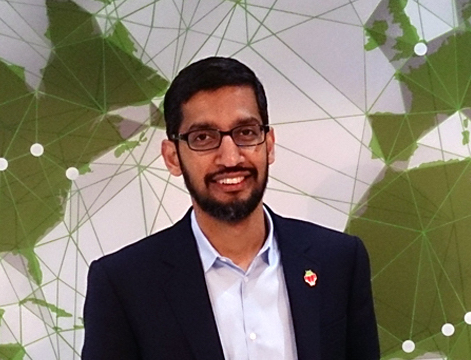At Google, a Sundar Pichai apology for sexual harassment stands out

The New York Times described several instances of sexual harassment by senior executives at Google. Now Google staff are protesting. Google’s CEO, Sundar Pichai, sent an internal email about the company’s policy, and it stands out for its directness.
In the wake of so many harassment allegations in the #MeToo era, it’s clear that there’s now a playbook for corporate cowardice. First, do not admit the problem is real. Second, force the executives out and pay them some sort of severance package. Third, apologize for “the situation” and pledge to make it better, but with no concrete steps. When sex, power, and lawsuits converge, pusillanimous bullshit is the standard for public statements.
Google didn’t follow that playbook.
How did it respond when the New York Times published its accusations? Here’s Pichai’s email, as published on Axios, with my commentary. I’ve put the weasel words in bold.
Hi everyone,
Since last week, I’ve heard from many of you. Some of you wrote me personally. Others have shared their thoughts with leaders and fellow Googlers. One thing that’s become clear to me is that our apology at TGIF didn’t come through, and it wasn’t enough. We hear you.
Commentary: TGIF is a company meeting. Pichai gets credit for recognizing that the company’s internal efforts fell short, and that he needed to do something more.
So first, let me say that I am deeply sorry for the past actions and the pain they have caused employees. Larry mentioned this on stage last week, but it bears repeating: if even one person experiences Google the way the New York Times article described, we are not the company we aspire to be.
Commentary: Larry here is Larry Page, cofounder of Google and CEO of Google’s parent company Alphabet. “Past actions and the pain they have caused employees” is not grammatically passive, but does dance around who is responsible. “Deeply” is a weasel word — what matters is not how sorry Pichai is, but what he does about it. However, it’s worth noting that this whole email is written in the first person and takes some responsibility. Pichai does not deny the description in the New York Times — he acknowledges that there is a problem.
I understand the anger and disappointment that many of you feel. I feel it as well, and I am fully committed to making progress on an issue that has persisted for far too long in our society… and, yes, here at Google, too.
Commentary: A bit defensive — yes, here at Google, too — but there is at least an admission that there is a problem.
As CEO, it’s been personally important to me that we take a much harder line on inappropriate behavior. We have taken many steps to do so, and know our work is still not done. Over the past two years, we have terminated 48 people, including 13 senior managers and above for sexual harassment. None of these people received an exit package. And to clarify: in that time, we have also not provided any exit packages to executives who departed voluntarily in the course of a sexual harassment investigation.
Commentary: Now we get to the action. This part is concrete — it identifies the number of people dismissed and makes the statement that nobody received an exit package to stay quiet. Assuming this is true, it is an unusually strong statement. If the New York Times’ reporting on past incidents is correct, then this means the policy has changed in the last two years in that the company is no longer paying people on their way out the door. I would like to know more about the “many” steps, but it’s clear that this work is in progress.
Some of you have raised very constructive ideas for how we can improve our policies and our processes going forward. I am taking in all your feedback so we can turn these ideas into action. We will have more to share soon. In the meantime, Eileen will make sure managers are aware of the activities planned for Thursday and that you have the support you need.
Commentary: Eileen is Eileen Naughton, VP People Operations at Google. In this closing part of the statement, Pichai actually supports the people walking out on Thursday to protest the sexual harassment there. He also promises to listen and follow up.
So, how does Pichai’s action stack up?
Here’s what’s best about Sundar PIchai’s statement.
- There is no defensiveness. There are no denials.
- There is a concrete statement with numbers about the magnitude of the problem.
- It sets a policy of no payments to people forced out for harassment, which is unusually firm.
- It is written in the first person and takes responsibility, for the most part, for the problem and solving it.
- It promises more action moving forward.
Here’s what’s lacking:
- Pichai doesn’t take personal responsibility for what happened. He is deeply sorry “for past actions and the pain they have caused” but not for being part of the problem. (If you’re the CEO, the problem is at least partly your fault.)
- While there is a promise of future steps, those steps remain just a promise for now. We don’t know what they are.
If Pichai follows through, this could be the first time a big company actually, provably changes its attitude towards sexual harassment. He has at least laid the groundwork.
I look forward to seeing if Google can become a leader in this area. Regardless, other companies facing problems like this could learn from what Pichai is doing here. Can you take responsibility and create change as he is promising to do?